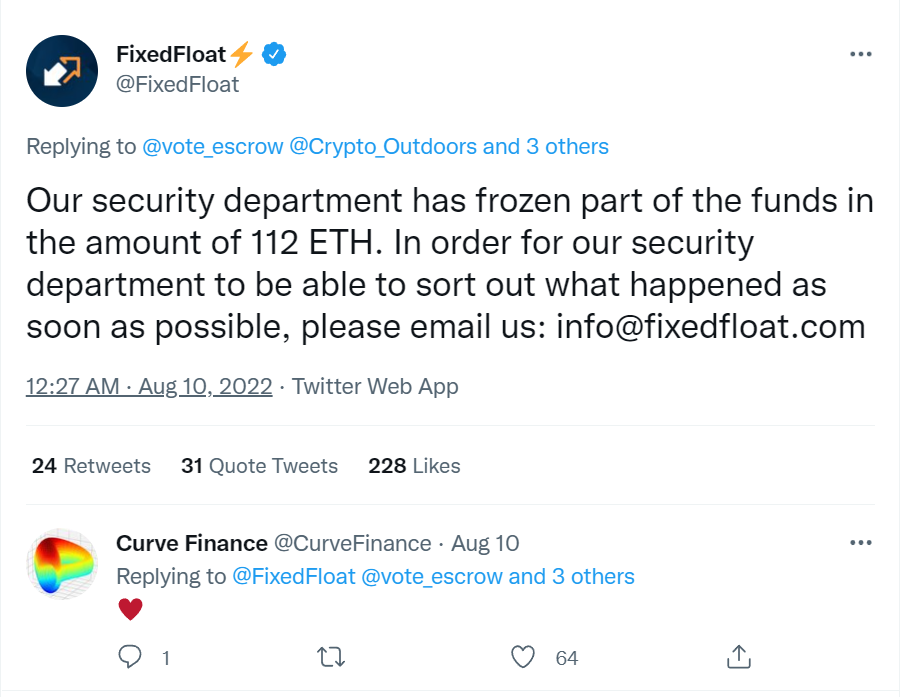As usual, it has been an eventful week for the crypto community. Curve Finance suffered a phishing attack that left the DeFi protocol missing $573,000. Another brutal loss: the US SEC continued to tighten its grip on cryptocurrencies by blacklisting Tornado Cash for US residents. These and other news in our weekly review.
Curve users lost $573,000 due to phishing attack
The Curve Finance DeFi protocol lost $573,000 worth of assets in a phishing attack on August 9th. The attacker took advantage of the Tornado Cash platform, Binance and FixedFloat. The FixedFloat security team quickly responded to the incident and froze 112 ETH.

Curve Finance immediately informed its users to wait for new guidance before using its platform after the incident. He later proposed and distributed a new domain name and advised users to withdraw all approvals for the malicious phishing contract.
According to the Iwantmyname hosting service, the attack occurred on August 9 at 19:00 (UTC), and experts restored access to the servers and infrastructure of Curve Finance at 21:00 (UTC) of the same day and without compromise. The root cause of the attack remains unknown as the investigation continues.
US authorities banned the use of Tornado Cash
As the US tightens regulation of cryptocurrencies, the US Treasury Department blacklisted Tornado cash on Monday. The ban was prompted by the fact that Tornado Cash is suspected of being used for money laundering. US authorities have banned their citizens from using Tornado Cash.
This news immediately led to a sharp drop in the price of the Tornado Cash token and the blocking of the assets of US residents on the platform. However, the sanctions have been criticized for inadvertently classifying Americans as potential criminals and banning good cryptocurrency users who simply want to use the platform to protect their privacy.
On August 10, the Netherlands got up and arrested a developer associated with Tornado Cash in Amsterdam. He is suspected of being involved in the cover-up and facilitating money laundering through the platform.
Iran makes first import order using cryptocurrency
This week, Iran joined the list of countries flirting with cryptocurrencies. Iran has made its first official $10 million import order using cryptocurrencies. While the report is silent on the specific cryptocurrency being used, the move could set the stage for the massive adoption of digital assets in the country.
The Iranian Ministry of Industry, Mines and Trade said on Twitter that "By September, the use of cryptocurrencies and smart contracts will be widely practiced in foreign trade with targeted countries." While the move opens up new opportunities for cryptocurrencies, it will also help the country sidestep heavy U.S. economic sanctions that have hit its economy in a dollar-dominated global economy.
Phantom, the Solana wallet provider, said its wallets were not affected by the hack
While the Solana accident investigation continues, Phantom, Solana's Web3 wallet provider, said its infrastructure was intact when Solana's 9,230 wallets lost $4.08 million.
Phantom added in a tweet that security investigations have not yet uncovered any traces of vulnerabilities that could help attackers.
Initial speculation linked Phantom, Slope, and other wallet apps to possible vulnerabilities that could facilitate a "supply chain attack" on the IOS mobile platform. However, the new data allowed the attack to be traced back to vulnerabilities in the Slope wallet application. The Solana team reportedly stated that all of the affected wallet addresses were used, created, or imported into the Slope app at some point.
Otter, an independent firm, confirms the conclusion of the Solana development team. Otter reported that Slope's weak securities could provide loopholes that allowed attackers to get seed phrases and withdraw funds. However, while some Phantom wallets were affected by the hack, Phantom stated that those affected by Phantom wallets were at some point imported from non-phantom sources.
In response to widespread rumors, Slope claims that it has not found the reason for the hack. However, as they complete their investigations with the TRM labs, the blockchain analytics firm, and law enforcement, the crypto community expects fuller reports.
Monero blockchain will be upgraded on August 13th
As the cryptocurrency community welcomes the flood of new features through updates, Monero has joined the roster of crypto giants like Ethereum and Cardano in preparation for the big update.
The Monero update will be launched this month and will include features such as:
- An increase in ring size from 11 to 16, “the largest absolute increase in the anonymity base set”, the update will also improve Monero's bullet algorithm.
- Reducing the size of the transaction by 5.7%.
- Increasing the speed and reducing the weight of transactions in the network.
The update will also change the transaction fee structure, improve security, resilience and reliability, fix bugs, and create a "tag viewer" that will reduce wallet sync by 40-50%. The update will be launched on August 13, 2022.
South Africa launches Machankura service for transferring BTC offline via SMS
Machankura, an innovative cellular network in South Africa based on SMS services, could be a game changer for Bitcoin. The Machankura service uses a mobile SMS service to support BTC transactions without using the Internet. This could mean unlimited expansion of the bitcoin community.
According to Ngak Kgotatso, the app's developer, users can initiate registration by dialing any number that brings up a menu. The menu prompts users to either learn more about bitcoin or sign up for an account and create a unique five-digit pin code. Upon successful completion of the process, users can send and receive bitcoins through their mobile phone using SMS. The innovation capitalizes on the widespread use of the telephone in Africa, while at the same time circumventing the problem of low Internet penetration by using SMS services.
Cardano joins Unisys pension fund as trustee
The idea that good things come in threes is finding support in Cardano's fortunes this week, as UK pension fund trustee Unisys has appointed the crypto network to act as the pension scheme's trustee. Cardano's appointment was only possible after a long and competitive selection process. As trustee of pension schemes, Cardano will provide investment advice, management, sound investment, risk management and growth to the organization's £1.2 billion portfolio.
The pension scheme has praised Cardano's integrated design for pension management and investment, its risk management, and the possible benefits that the scheme can derive from Cardano's expertise. The partnership raises Cardano's asset management limit to over £50 billion. In response to this statement, Patrick Cunningham stated, "We are very pleased with this appointment and look forward to working with the trustee, scheme sponsor and other advisors to help participants receive their benefits."
Astar Network and Acala announce major DeFi expansion partnership on Polkadot
This week, Polkadot welcomes an exciting partnership between its innovation hub Aster Network and Acala, a leading DeFi network. The partnership marked the launch of the "Astar x Acala DeFi Rising" program, which will open up new opportunities and rewards for developers and projects on the Polkadot platform.
However, the partnership will provide mutual benefits for the partners and Polkadot's Astra will receive the juiciest rewards. The partnership will enable developers to build within the Astar DeFi ecosystem using Acala's native assets such as aUSD, LDOT, and ACA. Bette Chen, co-founder of the Acala Network, enthused that “our deep integration with the Astar team is very exciting for us as we look to help accelerate the growth of Astar’s strong dApp ecosystem with USD liquidity and cross-chain use cases."
As the DeFi network powers financial applications across the Polkadot ecosystem and supports aUSD, Polkadot's stablecoin, Polkadot is strengthening Acala's ongoing support through this collaboration. And allows Polkadot users to enjoy the newly released Acala Liquid Staking, allowing them to stake DOT tokens with greater liquidity and security. Astar will also promote the mass adoption of aUSD in the multichain of the future by developing new use cases.










